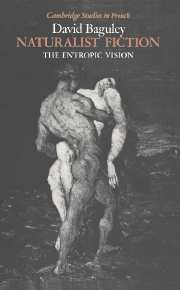Book contents
- Frontmatter
- Contents
- Acknowledgments
- Introduction
- 1 Histories
- 2 Theories: realism, naturalism, genre
- 3 The founding texts
- 4 The tragic model
- 5 Comic strains
- 6 In the ironic modes: naturalist satire and parody
- 7 The ‘scandal’ of naturalism
- 8 Naturalist description
- 9 The entropic vision
- 10 By way of conclusion: two English examples
- Notes
- Translations of passages in French
- Select bibliography
- Index
- Cambridge Studies in French
3 - The founding texts
Published online by Cambridge University Press: 14 October 2009
- Frontmatter
- Contents
- Acknowledgments
- Introduction
- 1 Histories
- 2 Theories: realism, naturalism, genre
- 3 The founding texts
- 4 The tragic model
- 5 Comic strains
- 6 In the ironic modes: naturalist satire and parody
- 7 The ‘scandal’ of naturalism
- 8 Naturalist description
- 9 The entropic vision
- 10 By way of conclusion: two English examples
- Notes
- Translations of passages in French
- Select bibliography
- Index
- Cambridge Studies in French
Summary
In Le Pacte autobiographique, Philippe Lejeune makes a vigorous attack on what he considers to be the general drift of traditional and much modern genre theory: the tendency to devalue history, to search for norms, to reject the essential conditions of history, which are relativity and variability. At the heart of the notion of genre as it is usually conceived, he argues, is a desire for permanence, an illusion of eternity, a belief that there exists an immutable backcloth against which history unfolds, with historical facts on the one hand and perennial types on the other. ‘Cet idéalisme anti-historique’, he writes, ‘projette dans le ciel des idées des “types” dont les genres historiques seraient des incarnations.’ He cites Northrop Frye's system in particular, based as it is on Platonic and Aristotelian principles and on what Lejeune calls ‘la division trinitaire des anciens entre l'épique, le dramatique et le lyrique’, as the most renowned example of this anti-historical idealism, which implies that there exists in literature an immanent structure of unchanging archetypes, all, as it were, so much ‘Frye in the sky’. Thus Lejeune unequivocally asserts the historical nature of literary genres and defines the essential purpose of a modern approach to generic studies: ‘Le travail de la théorie n'est done pas de construire un classement des genres, mais de découvrir les lois de fonctionnement des systèmes historiques des genres.’
- Type
- Chapter
- Information
- Naturalist FictionThe Entropic Vision, pp. 71 - 96Publisher: Cambridge University PressPrint publication year: 1990



